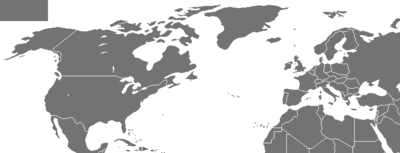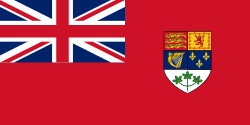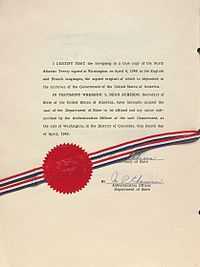North Atlantic Treaty
|
North Atlantic Treaty authentication page | |
| Type | Military Alliance |
|---|---|
| Signed | 4 April 1949 |
| Location | Washington, D.C. |
| Effective | 24 August 1949 |
| Condition | Ratification by the majority of the signatories including Belgium, Canada, France, Luxembourg, the Netherlands, the United Kingdom and the United States. |
| Signatories |
28
|
| Depositary | Government of the United States of America |
| Languages | French, English |
|
| |
The North Atlantic Treaty, signed in Washington, D.C. on 4 April 1949, is the treaty establishing the North Atlantic Treaty Organization (NATO).
Background
The treaty was drafted by a committee in talks in Washington which was chaired by Theodore Achilles. Earlier secret talks had been held at the Pentagon between 22 March and 1 April 1948, of which Achilles said:
The talks lasted about two weeks and by the time they finished, it had been secretly agreed that there would be a treaty, and I had a draft of one in the bottom drawer of my safe. It was never shown to anyone except Jack [Hickerson]. I wish I had kept it, but when I left the Department in 1950, I dutifully left it in the safe and I have never been able to trace it in the archives. It drew heavily on the Rio Treaty, and a bit of the Brussels Treaty, which had not yet been signed, but of which we were being kept heavily supplied with drafts. The eventual North Atlantic Treaty had the general form, and a good bit of the language of my first draft, but with a number of important differences.[1]
According to Achilles, another important author of the treaty was John D. Hickerson:
More than any human being Jack was responsible for the nature, content, and form of the Treaty...It was a one-man Hickerson treaty.[1]
The treaty was created with an armed attack by the Soviet Union against Western Europe in mind, but the mutual self-defense clause was never invoked during the Cold War. Rather, it was invoked for the first time in 2001 in response to the 11 September 2001 attacks against the World Trade Center and The Pentagon in Operation Eagle Assist.
Members
Founding members
The following twelve nations signed the treaty and thus became the founding members of NATO. The following leaders signed the agreement as plenipotentiaries of their countries in Washington D.C.:[2]

-
.svg.png) Belgium – Prime Minister and Foreign Minister Paul-Henri Spaak and Ambassador Baron Robert Silvercruys
Belgium – Prime Minister and Foreign Minister Paul-Henri Spaak and Ambassador Baron Robert Silvercruys -
 Canada – Secretary of State for External Affairs Lester B. Pearson and Ambassador H. H. Wrong
Canada – Secretary of State for External Affairs Lester B. Pearson and Ambassador H. H. Wrong -
 Denmark – Foreign Minister Gustav Rasmussen and Ambassador Henrik de Kauffmann
Denmark – Foreign Minister Gustav Rasmussen and Ambassador Henrik de Kauffmann -
 France – Foreign Minister Robert Schuman and Ambassador Henri Bonnet
France – Foreign Minister Robert Schuman and Ambassador Henri Bonnet -
 Iceland – Foreign Minister Bjarni Benediktsson and Ambassador Thor Thors
Iceland – Foreign Minister Bjarni Benediktsson and Ambassador Thor Thors -
 Italy – Foreign Minister Carlo Sforza and Ambassador Alberto Tarchiani
Italy – Foreign Minister Carlo Sforza and Ambassador Alberto Tarchiani -
 Luxembourg – Foreign Minister Joseph Bech and Ambassador Hugues Le Gallais
Luxembourg – Foreign Minister Joseph Bech and Ambassador Hugues Le Gallais -
 Netherlands – Foreign Minister Dirk Stikker and Ambassador Eelco van Kleffens
Netherlands – Foreign Minister Dirk Stikker and Ambassador Eelco van Kleffens -
 Norway – Foreign Minister Halvard M. Lange and Ambassador Wilhelm von Munthe af Morgenstierne
Norway – Foreign Minister Halvard M. Lange and Ambassador Wilhelm von Munthe af Morgenstierne -
 Portugal – Foreign Minister José Caeiro da Mata and Ambassador Pedro Teotónio Pereira
Portugal – Foreign Minister José Caeiro da Mata and Ambassador Pedro Teotónio Pereira -
 United Kingdom – Foreign Secretary Ernest Bevin and Ambassador Oliver Franks, Baron Franks
United Kingdom – Foreign Secretary Ernest Bevin and Ambassador Oliver Franks, Baron Franks -
 United States – Secretary of State Dean Acheson
United States – Secretary of State Dean Acheson
Later members
The following 16 nations joined the treaty after the 12 founding countries:
|
Content
Article 4
The treaty includes Article 4, which triggers not military intervention but merely consultation over military matters. It has been invoked three times by Turkey: once in 2003 over the Second Persian Gulf War (Iraq War), once in June 2012 after the shooting down of a Turkish military jet, and once again in October 2012 after Syrian attacks on Turkey and their counterattacks.[3] It was also invoked by Latvia,[4] Lithuania,[5] and Poland[6] in March 2014 in response to the 2014 Crimean crisis.
Article 5
The key section of the treaty is Article 5. Its commitment clause defines the casus foederis. It commits each member state to consider an armed attack against one member state to be an armed attack against them all. This article has been invoked only once in NATO history: by the United States after the September 11 attacks in 2001.
Article 6
Article 6 states that the treaty only covers member nations' territories north of the Tropic of Cancer, plus French Algeria. An attack on the US state of Hawaii, for example, would not trigger the treaty, but an attack on the other 49 would.[7]
See also
References
- ↑ 1.0 1.1 "Theodore Achilles Oral History Interview". Truman Library. Retrieved 2014-05-29.
- ↑ Bevans, Charles Irving (1968). "North Atlantic Treaty". Treaties and other international agreements of the United States of America 1776-1949. Volume 4, Multilateral 1946-1949. Washington, D.C.: Department of State. p. 831. LCCN 70600742. OCLC 6940. Retrieved 2013-05-01.
- ↑ "The consultation process and Article 4". NATO.int. 4 March 2014. Retrieved 4 March 2014.
Since the Alliance's creation in 1949, Article 4 has been invoked several times.... On two occasions in 2012, Turkey requested that the North Atlantic Council (NAC) convene under Article 4: once on 22 June after one of its fighter jets was shot down by Syrian air defence forces and the second time on 3 October when five Turkish civilians were killed by Syrian shells.... Previously, on 10 February 2003, Turkey formally invoked Article 4 of the North Atlantic Treaty, asking for consultations in the NAC on defensive assistance from NATO in the event of a threat to its population or territory resulting from armed conflict in neighbouring Iraq.
- ↑ "UNSC, EU, NATO to hold urgent meetings over Ukraine". 1 March 2014. Retrieved 6 March 2014.
Meanwhile, Lithuania and Latvia called upon the North Atlantic Council, the decision-making body of NATO, to hold an extraordinary session on Ukraine, citing security concerns.
, Turkishpress.com - ↑ Ford, Matt (1 March 2014). "Russia's Seizure of Crimea Is Making Former Soviet States Nervous". The Atlantic. Retrieved 4 March 2014.
Linas Linkevicius, Lithuania's foreign minister, responded on Saturday by invoking Article 4 of the North Atlantic Treaty ... for only the fourth time in the alliance's history.
- ↑ Baker, Peter (3 March 2014). "Top Russians Face Sanctions by U.S. for Crimea Crisis". The New York Times. Retrieved 4 March 2014.
NATO called its second emergency meeting on Ukraine in response to a request from Poland under Article 4 of the North Atlantic Treaty relating to threats to a member state’s security and independence.
- ↑ Hall, John (1965-08-08). "Hawaii Lacks NATO Coverage if Attacked". Chicago Tribune. UPI. pp. Section 1A, Page 4. Retrieved 29 April 2015.
- Watry, David M. Diplomacy at the Brink: Eisenhower, Churchill, and Eden in the Cold War. Baton Rouge: Louisiana State University Press, 2014.
External links
| Wikimedia Commons has media related to North Atlantic Treaty. |
| ||||||||||||||||||||
